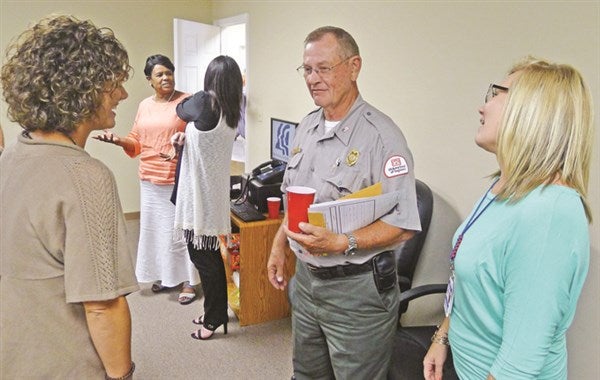MDOH
Published 12:00 am Tuesday, August 30, 2016

MDOH pharmacist/consultant Julia Woods (left) and MDOH CRI Coordinator Shea Garner (right) answer Enid Reservoir Manager Michael Robinson’s questions about establishing a closed POD for medicine distribution. “We’ve been taught to say, ‘there will be a disaster, we just don’t know when,’” MDOH Emergency Preparedness Planner Robbie Morgan (back) said during Wednesday’s meeting.
By John Howell
If Panola County is suddenly threatened by a serious, widespread epidemic or by an act of bioterrorism where deadly pathogens are introduced to large swaths of the county’s population, the Mississippi Department of Health (MDOH) would respond with a mass distribution of medicine to treat the resulting illness.
On Wednesday, public health officials asked for participation in a decentralized distribution plan that would help avoid chaos and confusion that might arise during medicine distribution from one location.
Meeting in Batesville’s Northwest Public Health District I headquarters with representatives of Batesville businesses, churches, health care providers, first responders, pharmacists and others, MDOH officials described utilization of closed points of distribution (POD) where countermeasure medicines would be distributed away from a central, open POD.
“Our mission statement is ‘get the pills to the people,’” State Medical Countermeasure Coordinator Donna Dreiling said. “We have two ways of doing this. One is with the open point of dispensing method — a large venue … some big public place where the general masses are going to come to receive their medication. People are going to be standing in long lines outside; I’m sure that all the stress levels are going to be pretty high that day.
“The second method is the closed point of dispensing,” Dreiling continued. “That’s what we’re here to talk with you guys about; that’s going to be the preferred method,” Dreiling said.
Almost any entity can sign up to become a closed POD — health care facilities, nursing homes, private businesses, churches, government offices.
“What happens with that method is that the employer receives the life-saving medication for his or her employees and their family members from the Mississippi State Health Dept., takes them back to their facility and distributes them to their employees and to their employees’ families,” Dreiling said.
“The more closed PODs we have, the more people that are taken out of those open POD lines,” she said. “There really are no negatives to this program,” she said.
“If we have a breakout of some sort, some people’s first thought would be, ‘well, I’ll just go to the hospital,’” Merit Health Batesville representative Newt Benson said.
“In my opinion, the hospital would be the last place you’d want to go if you were not sick and you did not need medical treatment,” Benson continued. “The hospital would be a hot zone.”
Benson said that the hospital has already been established as a closed POD for its staff, patients and families as well as for Panola County first responders and their families.
MDOH officials are trying to establish as many of the closed PODs as possible.
“The more of these closed PODs that we can get up and going in Panola County, the better off it’s going to be because that’s pulling away from those numbers of people who’ll be in those open PODs,” Panola Emergency Management Agency Director Daniel Cole said.
“With a closed POD, you do have to have some medical oversight,” said MDOH pharmacist/consultant Julia Woods. The oversight can be provided by a physician, pharmacist or a nurse practitioner working with approval of her or his supervising physician, according to Woods.
“There are a lot of pharmacists in the community, and several were here earlier today willing sign on and help businesses and organizations with being that medical oversight,” Woods said.
To date, 637 businesses an organizations in the state have signed up to become closed PODs, MDOH officials said.
The decentralized distribution is modeled on a response to mass anthrax exposure or influenza outbreak but is applicable to similar public health emergencies. The medicine would be drawn from the Strategic National Stockpile of the Center for Disease Control.
“This has been a wonderful day, because we’re educating our community about the importance of closed PODs,” MDOH Emergency Preparedness Planner Robbie Morgan said.
“We’ve been taught to say, ‘there will be a disaster,’ we just don’t know when. It’s all around us and it’s happening more and more frequently.”
For more information about how a business, industry, church or other organization can become a closed POD contact CRI Officer Shea Garner at the MDOH District 1 office, 662-563-5603 or Emergency Preparedness Nurse Debra Lewers at 662-563-614-3185.






